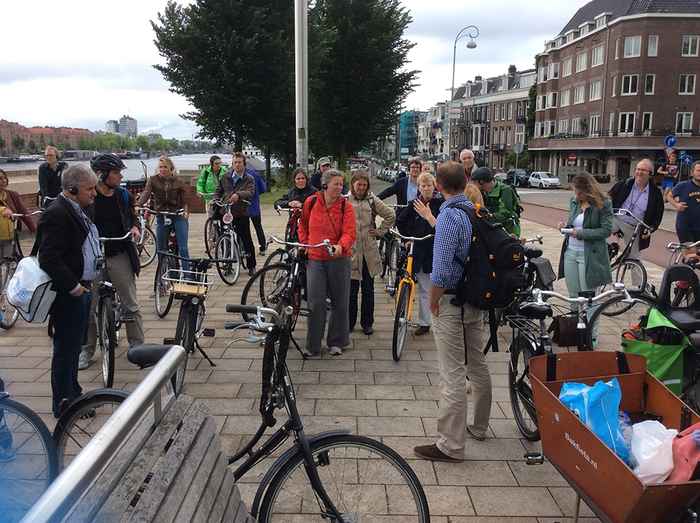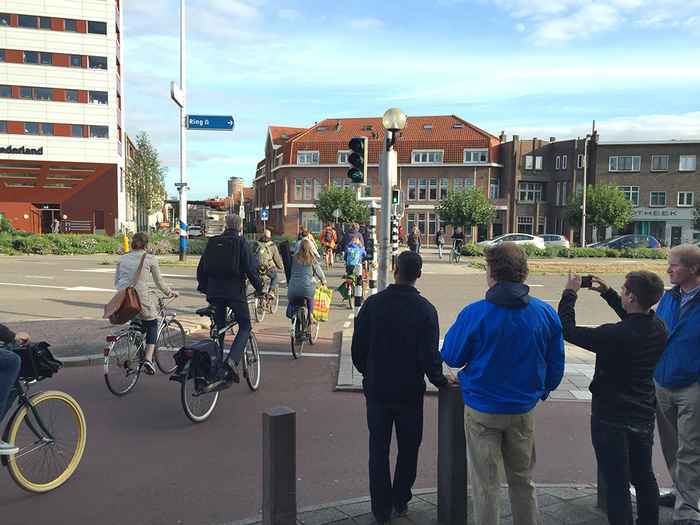Learning by doing: a closer look at the exportation of Dutch cycling knowledge – by Meredith Glaser
It’s historical, geographical and social diversity in cycling makes it an ideal ‘Living Lab’ for learning. Groups of city officials and professionals swarm to Amsterdam to soak up every bit of knowledge and practice surrounding infrastructure, design, communication, transport and built environment policies that have contributed to such an inspiring “cycling city” success story. Academic institutions are equally in demand for structured learning opportunities, real-world application and skill-building for students and courses like Planning the Cycling City are a result of this demand.

Nurturing the transfer of ideas
Some say that learning by doing is the best way to learn. In the case of urban cycling, it is certainly a popular way to learn. Many professionals want to see, feel and experience the real-life results of similarly implemented ideas. They want to talk to people, their equivalent peers, who have been in their shoes (albeit years ago). They want to better understand the processes, designs, and implications for what seems and feels to be impossible decisions at home. And, underneath it all, they might be curious about what it feels like to live a life in which the bicycle plays a mainstream role in everyday mobility. But how does this go down in reality?
Currently, little is known about this micro-industry, its leaders, its economic value, the impact on participants or cities they represent. Little is known about the curators or teachers, their backgrounds, the content they choose to discuss, the experiences or “lesson plans” they curate, the ways in which they engage their learners or facilitate group learning and dynamics, or how they work with others in this industry. Since structured records of delegations are lacking, little is known about motivations, backgrounds, roles and (power) relations within them. Finally, we know little about what these groups (individually and collectively) learn from their experiences, and how that impacts decisions or agency, project delivery, relations with others on the study tour, or personal behaviors.
After a few days – or hours, sometimes – of riding around Dutch cities and listening to experts, people travel back to their home cities. Often, they are exhausted but full of inspiration, with great hopes of “translating” lessons learned and adapting Dutch principles to their own context. There is no doubt that change occurs at some point after one of these trips. Nor that resistance to such change also occurs. In my research, I aim to disentangle these contradictions.

Amsterdam’s opportunity
Of course other cities and their leaders want to learn from Amsterdam. And Amsterdam is undertaking the challenge, and moral obligation, to serve as an effective learning context for these groups. However, as any century-old relationship, Amsterdam’s history with the bicycle is one fraught with complexity, intangibles and nuance. Disassembling that story into a series of readily digestible, clear-cut components for a variety of audiences must be a challenging craft. And on the other side, learning this story also seems to have other unique challenges for our visitors, namely trying to understand how the Amsterdam story can relate to them, their family, colleagues, profession, their city, their culture. And riding a bike at the same time.
In the coming years, I will use knowledge from education, anthropology, and policy mobilities to unravel the implications for transportation policy transfer and policy learning. What an opportunity Amsterdam has at its fingertips right now! It only makes sense to enhance our understanding, our awareness and to make the most of its unique position.
Meredith Glaser
Meredith Glaser is PhD Researcher within the Centre of Urban Studies and the Department of Geography, Planning and International Development Studies at the University of Amsterdam. She is embedded within the Urban Cycling Institute, researching policy mobilities of Dutch cycling policies and practices and co-director of Planning the Cycling City. Her research is supervised by Marco te Brömmelstroet and Luca Bertolini and unravels the role of learning, teaching and the built environment in the international transferability of Dutch urban cycling policies and practices. Her PhD research will build upon the results of the Interreg project CYCLEWALK, wherein five EU countries will be increasing their knowledge and practice around walking and cycling policies and infrastructure over the next five years. The kick-off is in Amsterdam on April 5, 2017.